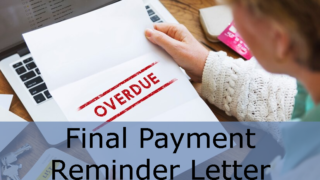How to generate a Final Payment Reminder Letter

A Final Debt Collection Letter, also known as a Letter before Action, is a short, clear demand to repay an outstanding payment from a client or customer after previously issuing reminder letters.
What are Debt Collection Letters?
Debt Collection Letters are the first step in the debt collection process. In order to recover debt, it is recommended to first issue late payment reminder letters to clients or customers about overdue payments. These are also known as Demand Letters or Letters of Demand.
Why send Debt Recovery Letters?
Debt recovery is a major concern for many small businesses. Late payment reminder letters can be a useful and affordable way of chasing up overdue invoices by prompting a customer to pay the overdue amount. Having a structured credit control process in the collection of debt saves time spent collecting payments and managing cash flow.
What is a First Payment Reminder Letter?
A First Debt Collection Letter is a short, friendly reminder to repay an outstanding payment from a client or customer. It should be as polite and friendly as possible and professional. It can be sent by any means but it is usually sent by e-mail or postal mail.
What is a Second Payment Reminder Letter?
A Second Payment Reminder Letter serves as a follow-up reminder after already issuing a First Payment Reminder Letter, and the tone can be more direct than the first. It helps to minimize the amount of valuable time and effort spent chasing late payments and serves as part of a structured credit control process. It can be sent by any means but it is usually sent by e-mail or postal mail.
What is a Final Debt Recovery Letter?
Also known as a Letter before Action, a Final Debt Recovery letter is the third and final reminder to pay an outstanding debt. Basically, it is a short, clear demand to repay an outstanding payment. Either, it may or may not, include the mention of pursuing legal action if the debt is not settled. Importantly, it is not a legally binding document and can be re-issued multiple times.
What is the Pre-Action Protocol for Debt Claims?
In the UK, the Ministry of Justice has released requirements with regards to the information and process required in order to claim payment of the debt from an individual or sole trader before court proceedings can be issued. The Pre-Action Protocol for Debt Claims serves as a good general business debt collection best practice guideline.
What are the requirements of the Pre-Action Protocol for Debt Claims?
In order to satisfy the requirements of the Pre-Action Protocol for Debt Claims, your communications should include:
- Details of the amount owed and the agreement under which this debt originates
- Up to date details of any interest and administrative charges added
- Payment instructions including the method of and address of payment
- Information about payment options available to the debtor
- A Reply Form, Information Sheet, Financial Statement Form, and a reply address for the Reply Form.
Letters should be clearly dated and sent by post unless alternative methods of communication have been explicitly requested.
Does a Letter before Action have to be sent by registered mail?
A Final Debt Recovery Letter, or Letter before Action, should be sent by postal mail unless alternative methods of communications have been explicitly requested. However, the gravity and intention of debt collection are communicated with a better chance of success if sent by registered mail.
When to send Payment Recovery Letters?
Payment Recovery Letters should be sent when a payment is overdue. A payment is overdue when an outstanding payment is outside the payment terms. If payment terms have not been specified, it is usually customary to consider a payment overdue after 30 days.
What are Payment Terms and Payment Instructions?
In essence, payment terms are the conditions under which a payment should be made. Usually, payment terms include when a payment is expected, any conditions on that payment, and any discounts or penalties relating to the timing of the payment. Subsequently, payment instructions are the means and methods of payment.
What are Common Payment Terms?
Essentially, parties are free to negotiate the desired payment terms. In practice, the provider of a good or service will normally have standard payment terms. Common payment terms include:
- Payment in Advance
- Or, Net 7 (payment due 7 days after invoice date)
- Net 30 (payment due 30 days after invoice date)
- Or, Net 60 (payment due 60 days after invoice date)
What is the difference between an Invoice and a Payment Request Letter?
An invoice, also known as a bill, is a commercial document issued by a seller to a buyer requesting payment for the provision of goods or services. It can be issued in advance or afterward. It usually includes a breakdown of the costs for the goods or services provided, the total amount due, payment instructions, and payment terms.
Is a final payment reminder sent via email legally binding?
It is better to have been in contact with the debtor before sending in a reminder for the final payment. The final payement reminder can be sent through an email with a followup final payment reminder via registered post. In case there is a legal proceeding there will be proof that effort was made to get in contact with the debtor.
Conclusion
Payment Request Letters are follow-up communications after an invoice has been sent but no payment received. They are commercial documents part of the debt collection process. Payment Request Letters are the first step if a customer is slow-paying invoices or refusing to pay an invoice.
You Might Also Like
Along with this document, make sure you see these other templates in our library:
- Shareholder Agreement
- Option Agreement
- Employee Option Repurchase Agreement
- Share Appreciation Rights Plan
- Share Option Plan
Stay compliant with the Zegal template library
Zegal legal template are meticulously crafted with the precision of AI and the expertise of seasoned human lawyers, providing a unique blend of speed and reliability.
You can trust that Zegal agreements are legally sound and fully compliant with current regulations.
Whether you're a startup, SME, or a larger enterprise, Zegal contract management will automate and speed up your legal processes.
Using Zegal will reduce risk, save money, and improve efficiency. Let us take care of the paperwork so you can focus on running your business.
Don’t compromise on speed or compliance. Stay secure, compliant, and efficient with Zegal.







